Contents
- Composition and calorie content
- 8 Health Benefits of Flax Seeds
- Benefits of flax seeds for women
- Benefits of flax seeds for men
- Other Health Benefits of Flax Seeds
- What does flax seed treat?
- What are the benefits of flax seed oil? (linseed oil)
- Harm of flax seeds
- 4 Ways to Take Flax Seeds Properly
- How to grind flax seeds and how to store them?
- Flax seed treatment, recipes
- Popular questions and answers:
- Contraindications to the use of flax seeds
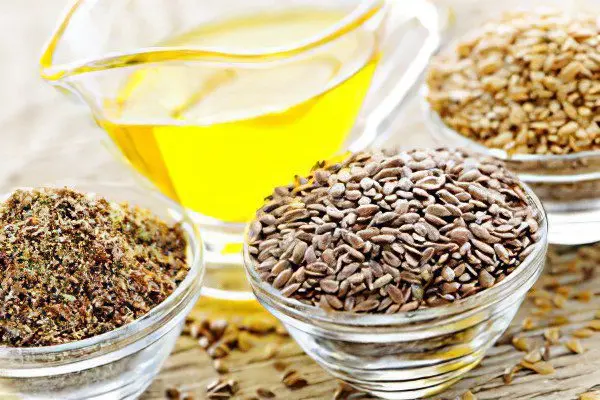
Flax is a plant that has long been used for the production of yarn and dietary oil. Linen clothing is highly durable and wear-resistant, has high hygroscopicity and thermal conductivity, and is environmentally friendly. Flax seeds are used in folk medicine for the mild and natural treatment of many diseases, as well as for culinary purposes. And linseed oil is a dietary product, a source of essential fatty acids that are unable to be synthesized by the body on its own.
Three types of flax are common:
Len-debtor – differs in long stems up to 70 cm in height, branches weakly, is used in the production of fibers for yarn, in the textile industry.
Len-curly – gives dozens of times more boxes than fiber flax, low and well branched, used in the production of oil.
Len-mezeumok – has the properties of the above two types, can be used both for the production of butter and for the manufacture of coarse fabrics.
A rich list of active ingredients of flax seeds (fatty acids, pectins, lignans and phytosterols) makes it an excellent tool for the treatment and prevention of diseases of the digestive tract, heart, blood vessels, as well as to enhance immunity.
Composition and calorie content
Flaxseeds contain many other useful substances, due to which they are rightfully referred to as a functional food source. [1].
Calories 534 KKal
- Fats:
42,2 g
- Proteins:
18,3 g
- Carbohydrates:
1,6 g
- Water:
7,0 g
- Ash:
3,7 g
- Cellulose:
27,2 g
Vitamins (in 100 g): | Quantity | %RDN |
Vitamin B1 (thiamine) | 1,64 mg | 110% |
Vitamin B6 (pyridoxine) | 0,47 mg | 24% |
Vitamin B9 (folic acid) | 87 mcg | 22% |
Vitamin B5 (pantothenic acid) | 0,99 mg | 20% |
Vitamin B4 (choline) | 78,8 mg | 16% |
Vitamin B3 (PP, nicotinic acid) | 3,1 mg | 15% |
Vitamin B2 (riboflavin) | 0,16 mg | 8,9% |
Minerals (in 100 g): | Quantity | %RDN |
Manganese, Mn | 2,5 mg | 124% |
Copper, Cu | 1220 mcg | 122% |
Magnesium, Mg | 398 mg | 98% |
Phosphorus, Ph | 642 mg | 80% |
Selenium, Se | 25,4 mcg | 46% |
Zinc, Zn | 4,34 mg | 36% |
Iron, Fe | 5,73 mg | 32% |
Calcium, Ca | 255 mg | 26% |
8 Health Benefits of Flax Seeds
Significant benefits of flax seeds include:
Essential fatty acids omega 3, 6, 9
Polyunsaturated fatty acids of omega-3, 6, and 9 groups, the content of which is higher in linseed oil [2]than in fish oil, are important for the growth and development of a young organism and the proper functioning of the vascular system. Omega-3 makes up as much as 53,4% of the total fatty acids. As you know, omega-3 has the property of blood thinning, which is a good prevention of thrombosis, atherosclerosis (reduces the growth of atherosclerotic plaques [3]) and vascular and heart diseases [4].
In addition, there is a large review of 27 studies involving more than 250 people. Omega-000 consumption has been shown to reduce the risk of cardiovascular disease by 3% [5].
Cancer Prevention
Flax seeds are a rich source of lignans, which may reduce cancer risk and improve health. Lignans are plant compounds with antioxidant and estrogenic properties.
Lowers cholesterol
Another health benefit of flax seeds is their ability to lower cholesterol levels. This effect appears to be related to the dietary fiber in flaxseed, as it binds to bile salts and is then excreted from the body. To replenish these bile salts, cholesterol travels from the blood to the liver. And it is this process that lowers the level of cholesterol in the blood.
One study in patients with high cholesterol found that eating 3 tablespoons (30 g) of ground flax seeds daily for three months reduced total cholesterol by 17% and “bad” LDL (low-density lipoprotein) cholesterol by almost twenty% [6].
Another study was conducted on diabetic patients. Taking 1 tablespoon (10 grams) of flaxseed powder daily for just 1 month resulted in a 12% increase in “good” HDL (high-density lipoprotein) cholesterol [7].
Reduces pressure
There have been many studies that have confirmed the effectiveness of flax seeds in lowering blood pressure.
A Canadian study found that consuming 30 grams of flax seeds daily for six months lowered blood pressure by 10 mmHg. [8]
And for those patients who were already taking blood pressure medication, flax seeds lowered blood pressure even more and reduced the number of patients by 17%.
Lowers blood sugar
Several studies have shown that people with type 2 diabetes who added 10–20 grams of flaxseed powder to their daily diet for at least 1 month experienced an 8–20% reduction in blood sugar levels. [7].
This blood sugar-lowering effect is due, in part, to the insoluble fiber content of flax seeds. Studies have shown that insoluble fiber slows down the release of sugar into the blood and lowers blood sugar levels.
Rich in selenium
Selenium in the composition of seeds restores the deficiency of this microelement, which is often observed in residents of large cities, as well as in those who consume a lot of carbohydrate foods. Selenium protects nucleic acids from destruction, reduces the risk of cancer and cardiovascular diseases.
100 grams of seeds contain 25,41 micrograms. selenium, which is 30% of the daily requirement.
Potassium, magnesium and calcium – for the health of the whole body
These 3 essential minerals are vital for a person. With their help, cellular transport is realized, they are necessary for the coordinated work of all human organs and systems. With a lack of potassium and magnesium, heart rhythm disturbances, edema, problems with the kidneys and excretory system are observed. In the composition of flax seeds, when converted to dry weight, there is more potassium than in bananas, which are traditionally recommended for use with a deficiency of this microelement.
100 grams of flax seeds contain: 391 mg magnesium (100% DV), 813 mg potassium (30% DV), and 255 mg calcium (25% DV) [9].
Lecithin and Vitamin B1
Lecithin in the composition of flax seeds protects nerve cells from damage, prevents the development of mental illness, postpartum depression and depressive conditions.
A vitamin B1 (thiamine) 100 grams contains 1,66 mg, which is 100% of the daily requirement.
Benefits of flax seeds for women
Flax seeds are good for women’s health due to the content of phytoestrogens – plant analogues of female hormones in the outer layer of seeds (they are especially abundant in white flax). Regular consumption of flax seeds alleviates the negative manifestations of menopause and is an excellent prevention of cancer of the breast and uterus.
A 2005 study of 30 women showed that consumption of 40 grams of flaxseed per day could reduce the frequency or severity of hot flashes in women who were not using estrogen therapy during menopause. [11].
Studies show that those women who consume flax seeds have a lower risk of postmenopausal breast cancer. [12].
In addition, according to a Canadian study of more than 6 women, those who eat flax seeds are 18% less likely to get breast cancer. [13].
Benefits of flax seeds for men
For men, flax seeds are beneficial because of the high amount of zinc. Zinc is an important mineral for men, it is involved in the process of maturation of spermatozoa and affects the degree of their mobility. The fertility of a particular man depends on the amount of zinc. 100 grams of flax seeds contain 4,34 mg of zinc, which is 40% of the daily requirement.
In a small study of 15 men, those who took 30 grams of flaxseeds per day while on a low-fat diet showed a reduction in a marker of prostate cancer, suggesting a lower risk of prostate cancer. [14].
In addition, there is a study published in 2008 in which 161 men took part. They consumed flaxseeds every day, which seemed to stop the growth of prostate tumors, especially if the men were also on a low-fat diet. [15].
Other Health Benefits of Flax Seeds
Polysaccharides in the shell of flax seeds can bind water – that is why, when the seeds are infused, a viscous jelly is formed, which is taken orally to treat gastrointestinal diseases. If you chew flax seeds, they will swell in the intestines, enveloping its mucous membrane, which promotes regeneration. These properties of flaxseeds are used in the folk treatment of psoriasis, intoxication or intestinal disorders.
Flaxseeds normalize the function of the digestive system, are used for the prevention of liver diseases and the rehabilitation of patients in the postoperative period.
What does flax seed treat?
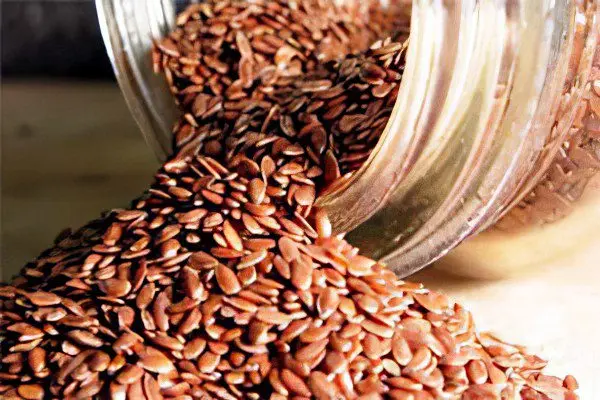
Chronic constipation – The fiber contained in the shell of flaxseed helps to gently cleanse the intestines and restore its mucosa. Just one tablespoon of flax seeds contains 3 grams of fiber, which is 10% of the recommended daily allowance.
What’s more, flaxseeds contain two types of dietary fiber – soluble (20-40%) and insoluble (60-80%) – which both help regulate blood sugar levels and lower cholesterol levels. [10].
Atherosclerosis – Flaxseed oil lowers the amount of so-called “bad cholesterol” in the blood, which prevents the formation of atherosclerotic plaques, and also increases the tone and elasticity of blood vessels.
Parasitic invasions of the body – flax has anthelmintic properties, cleanses the intestines from parasites.
Diseases of the gallbladder and liver.
Diseases of the genitourinary system inflammatory nature.
For diseases of the throat and respiratory system a decoction of flax is used for rinsing or drinking.
With pathologies of the digestive tract, dyspeptic disorders, ulcers, gastritis, diseases of the intestines and stomach, use kissel from flax seeds or chew whole seeds.
What are the benefits of flax seed oil? (linseed oil)
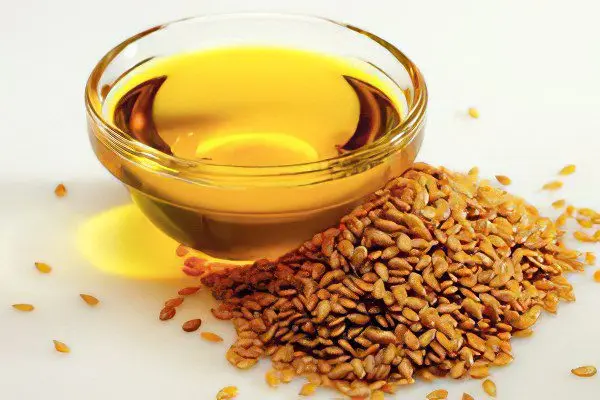
The biggest advantage of flaxseed oil is considered to be a high proportion of polyunsaturated fatty acids from the omega-3 and omega-6 groups, ideally entering the body from external sources constantly. Similar fatty acids are also present in pumpkin, walnut, sesame, corn and even sunflower oil, why is linseed oil considered the most useful?
The fact is that only the presence of certain components in the composition of the product is not enough, their ratio is also important. The ratio of fatty acids 1:4 (omega-3 to omega-6, respectively) is considered optimal in Japan and Sweden, the norm is 1:5. But for most people, there is a significant predominance of omega-6 acids in the diet, which leads to an increase in blood cholesterol, an increase in blood viscosity and creates a risk of heart attack, atherosclerosis and other diseases of the cardiovascular system.
Only two types of vegetable oils – camelina and linseed – contain the optimal proportion of polyunsaturated fatty acids, so they are better absorbed and contribute to the prevention of cardiovascular diseases, intestines and the digestive system.
In addition to polyunsaturated acids, flaxseed oil is rich in B vitamins necessary for the stable functioning of the nervous system, contains antioxidant vitamins A and E, which allow the body to fight the negative effects of free radicals. Lecithin and a complex of minerals (potassium, zinc, iron, magnesium, phosphorus) in the composition of flax seed oil prevent the development of iron deficiency and endocrine disorders.
Flaxseeds and oil are folk remedies and can be taken daily in amounts of 5 to 50 grams to strengthen the body, increase immunity and lower cholesterol. This is a good prevention of hypertension, myocardial infarction, stroke and thrombophlebitis, as well as coronary heart disease.
In addition, flaxseed oil is an indispensable product in the diet of vegetarians who get omega-3 from it. Other sources of essential fatty acids include marine fish (herring, salmon, mackerel), fish oil, and omega-3 supplements in capsules. However, the first two products cannot be present on a vegetarian menu, and omega-3 in nutritional supplements is usually poorly absorbed by the body and has dubious beneficial properties, since it is impossible to control its storage conditions and quality.
More: The benefits and harms of linseed oil, how to take? ➤
Harm of flax seeds
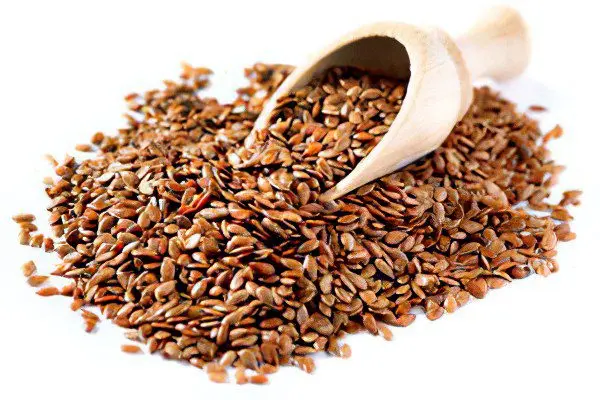
Flax seeds practically do not carry any harm, they should be used with caution only in case of hypercalcemia or individual intolerance.
But since flax seeds are harmless and safe to use, why is the sale of flaxseed oil banned in many countries? The fact is that flaxseed oil is the leader in the content of unsaturated fatty acids of the omega-3 group (up to 54% of the mass fraction, compared to 1% in sunflower oil that is familiar to us). These substances are extremely beneficial for health, as they contribute to the prevention of atherosclerosis and can significantly lower cholesterol levels, are a structural component of cell membranes and are necessary for the synthesis of prostaglandins. But under the influence of light and heat, fatty acids are instantly oxidized, peroxides are formed, which, on the contrary, are very harmful to the body and can even have a carcinogenic effect.
You can determine the presence of oxidized fats in the composition of the oil by its taste – it acquires a bitter aftertaste and a specific smell. Never drink this oil! It will deal a significant blow to your health!
The optimal storage conditions for linseed oil are in a dark and cool place; linseed oil must be transported in an opaque container (made of tinted glass, ceramics, etc.).
Flaxseeds have a longer shelf life than oil because the fatty acids in them are protected by the seed coat, but they also need to be taste tested before use. Ground seeds with a broken shell oxidize as quickly as oil, which is why they need to be crushed immediately before use.
Commercially available flax flour contains ground and dried flax seeds. It does not contain the fatty acids we need, so flaxseed meal spoils less if stored properly. But it is also deprived of most of the useful substances, although products based on it supply the body with fiber and help with intestinal disorders.
4 Ways to Take Flax Seeds Properly
Flax seeds can be taken in different ways, here are a few recipes:
Flax seed with kefir. The combination of kefir and flaxseeds is used as an aid in diets or exercise for speedy weight loss. To 100 grams of kefir add one tsp. seeds. This mixture should be replaced with breakfast or dinner, drink on an empty stomach. To speed up the process after the first week of use, the dose of seeds can be increased to two tablespoons, and after two weeks – up to three.
A decoction of flax seeds. To comprehensively cleanse the body and improve the condition of the skin, you need to prepare a decoction of flaxseed: pour a tablespoon of seeds with half a liter of boiling water and keep on low heat for thirty minutes, then wrap in a cloth (towel, blanket) and wait until cool. A warm decoction, reminiscent of jelly, should be drunk after waking up and before going to bed on an empty stomach, 250 ml each. For taste, you can add a spoonful of sour juice (lemon, cherry, pomegranate, etc.) to the broth.
Infusion of flax seeds. An infusion of flaxseeds, which can be prepared according to a prescription, helps to soothe the mucous membranes of the gastrointestinal tract and cleanse the intestines. Pour three tablespoons into a liter thermos. l. flaxseed, which must be poured with boiling water. The future infusion cools for three hours, after which it must be filtered and the collected cake squeezed into a closed opaque bowl. Before the main meals (30 minutes) and between them, you need to take 150 g of infusion for a month.
Kissel from flax seeds. Flaxseed jelly is taken to treat gastritis, chronic constipation, peptic ulcer and intestinal disorders, it helps to normalize the condition of the stomach and improve metabolism. A tablespoon of flaxseeds is poured into 500 ml of boiling water, then infused for eight hours. Cooking time can be shortened by first grinding the seeds in a coffee grinder. To make the drink more palatable, honey, cinnamon or vanilla is added to it, brewed with chicory or mixed with berry jelly, brewed oatmeal. Kissel must be washed down with plenty of water, it should not be drunk with pancreatitis at an acute stage.
There is also a drug made from flaxseed oil called linetol. It has an anti-sclerotic and wound-healing effect. Take it once a day on an empty stomach, 1 ml for a month.
Ground or Whole – What’s the Best Way to Use Flax Seeds?
Our intestines are unable to break down the tough outer shell of seeds. Therefore, you will not get as much benefit by taking them as a whole. Moreover, ground flax seeds are easier to digest.
How to grind flax seeds and how to store them?
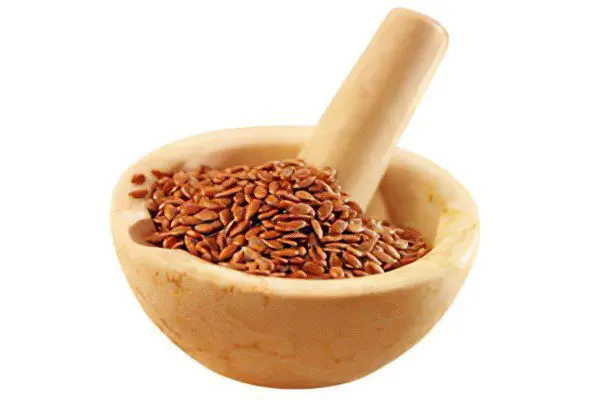
Ground flax seeds are more convenient to use in recipes, as they reduce the preparation time for infusions and decoctions. In addition, ground flaxseed can be added to meals and salads to increase their nutritional value. Flax is added to baking flour because it makes it softer – in Canada it has even become the standard for making bread.
Ground flaxseeds, which can be found on sale, are most likely of little health benefit, especially if they are sold in transparent packaging and lie in the light. It will be much cheaper and healthier if you buy whole grains and grind them at home. To do this, you can use almost any kitchen appliance – a blender, coffee grinder, food processor, and even a mechanical spice grinder. But it is best to purchase a miniature electric mill, which will allow you to quickly and easily get the right portion of ground seeds. In addition, you can use the old way and grind the seeds with a pestle in a mortar.
Whole flax seeds retain their beneficial properties for 12 months, but ground flax seeds cannot be stored for that long, they must be ground again each time. This is due to the properties of fatty acids in the composition of flax – omega-3 is quickly oxidized under the influence of sunlight or high temperatures and turns into a carcinogen hazardous to health. Therefore, if you still have excess seeds after grinding, you need to store them in a darkened container without access to air in a cool, dry place, or frozen.
Flax seed treatment, recipes
Flax seeds for inflammation of the pancreas
Flax jelly is used to treat the pancreas. It is done like this: two tablespoons of seeds are crushed in a coffee grinder and poured with boiling water (at the rate of 0,2 liters per tablespoon), simmer for about 10 minutes, after which they insist 1 hour. After that, filter through a strainer and add honey to taste, but not more than two tablespoons.
The effectiveness of the use of flax for the treatment of pancreatitis is provided by astringent and anti-inflammatory substances in its composition. In addition, the fiber of flax seeds helps to normalize metabolism and remove toxins from the body.
Flax seeds should be used with caution in pancreatitis; these recipes should not be used in the acute stage of the disease, as well as in cholelithiasis.
On the subject: The most effective recipes for pancreas recovery ➤
Flax seeds for gastritis
Flax seeds have been successfully used to alleviate the negative symptoms of gastritis (read more about the disease), such as pain, heartburn, and nausea, due to its anti-inflammatory properties. For the treatment of gastritis, an infusion of flax seeds is used – two tablespoons of seeds, cleaned of impurities, are poured with a liter of boiling water and left in a thermos or saucepan wrapped in a towel overnight. Take 200-300 ml before meals.
In addition, crushed flaxseeds with kefir and flaxseed jelly effectively relieve the symptoms of gastritis. With gastritis with low acidity, a decoction of flax seeds helps food pass through the stomach without injuring the damaged areas of the mucosa, which usually causes pain.
On the subject: Stomach ache: what to do? ➤
How to take flax seeds for constipation?
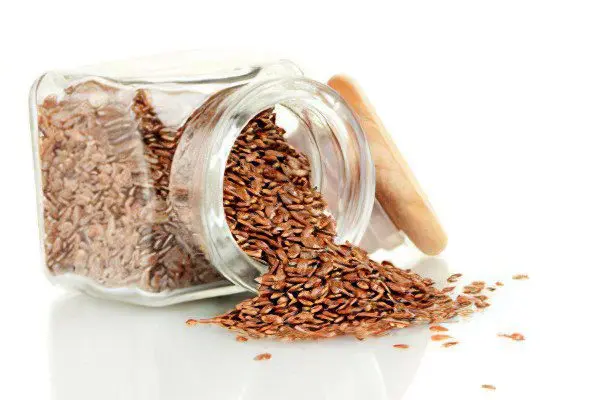
Flaxseeds are used as a mild laxative for chronic constipation due to their high fiber content. Strong laxatives disrupt the balance of minerals in the body, lead to potassium deficiency and irritation of the intestinal mucosa.
For the treatment of chronic constipation, flaxseed infusions are used (100 grams of seeds per 1 liter of boiling water), as well as crushed flaxseeds, which must be washed down with plenty of water so that they are promptly excreted from the body.
After two to three days of systematic use of flax seeds, the metabolism and self-cleansing processes of the intestines are normalized, its microflora is restored and the damaged mucosa is regenerated.
On the subject: Laxatives – which one to choose? ➤
Flax seeds for diabetes
For the treatment of diabetes, an infusion of seeds should be drunk twenty minutes before meals or taken at night. There are fast and slow ways to prepare such an infusion. In the first case, two l. seeds should be poured with boiling water (100 g) and infused for several minutes, after which they are diluted with cooled boiled water to the volume of one glass and drunk 20 minutes before meals. The second way is to pour two teaspoons of seeds with a glass of boiled, but cooled water and leave for two hours.
A decoction of flaxseeds is prepared as follows: two tablespoons are ground in a mortar and poured with half a glass of boiling water, after which they are boiled over low heat for 5 minutes. The cooled broth is drunk at a time before meals. If you are concerned about constipation and intestinal disorders, you can not strain the broth, but drink it along with crushed seeds.
How to brew flax seeds to treat stomach ulcers?
Flax seed mucus products, such as infusions and decoctions, are used to treat peptic ulcers due to their coating properties, which speed up the healing of gastric mucosal lesions. The seeds are brewed correctly as follows: in a container with three tablespoons of washed and peeled seeds, add two cups of boiling water and leave in a thermos for several hours. The infusion needs to be shaken two or three times – immediately after brewing, and half an hour later in the process. Apply it in a course of one to two weeks, half a glass an hour before each meal. Every day you need to brew new seeds, as they quickly lose their beneficial properties.
On the subject: 9 healing foods for stomach ulcers ➤
Popular questions and answers:

“Why boil flax seeds? They lose their useful properties! The answer here is simple, both options are correct, another thing is, what is your goal? For weight loss and health improvement, the seeds are prayed and eaten immediately. In this case, all fatty acids are preserved, and you get the fiber that your intestines need. If we are talking about some kind of inflammatory disease, then the seeds need to be brewed! When brewed, a special jelly is formed, which has a calming effect.
What is the rate of consumption of flax seeds? How much can be consumed per day? The generally accepted norm for the use of flaxseeds for an adult body weighing about 70 kg is 24 grams per day. Some researchers and nutritionists also claim that a completely harmless daily dose of seeds is 40–50 g.
Is it possible to eat flax seeds during pregnancy and while breastfeeding? Subject to the natural norm of the use of flaxseeds for a pregnant woman, there is no danger. But at the same time, she should definitely consult with her obstetrician-gynecologist. The doctor should be aware that potent herbal actives can be found in this product, which increase the tone of the uterus when a sufficient dose is received. To avoid premature births and miscarriages, the gynecologist most often prohibits taking not only modern medicines, but also folk ones, including flax seeds. As long as the baby is being fed naturally, flaxseeds should not be actively consumed in order to avoid the active substances of plant origin from entering the fragile developing organism. Nevertheless, it is possible to use funds based on them in small doses on the recommendation of a doctor.
Can I give my baby flax seeds? For children, the use of flaxseed for preventive purposes (no more than five grams per day), perhaps starting from the age of three. You can increase the dose of seeds only for medicinal purposes on the recommendation of a doctor after a comprehensive medical examination of the child.
Can flaxseeds be eaten dry? Flaxseeds can be eaten dry, chewed thoroughly and washed down with plenty of water. The seeds swell completely and become available for the digestive system in the intestines, so the intake of dry seeds is possible only if there are no inflammatory diseases in it. Studies show that alpha-linoleic (omega-3) fatty acid retains structure and nutritional value with slight heat treatment, so crushed seeds can be added to various dishes to increase nutritional value and enrich the taste, and flaxseed flour is often added to baked goods.
How long and how often can you drink flax seeds? Regardless of the form of use (raw materials, in the form of a decoction, mucus, powder or oil), the use of flaxseed, most often, occurs in small portions three times a day. The use of various solutions obtained by insisting on cold or hot water is mandatory before meals. Dry and crushed seeds are eaten with food in its composition or instead of eating (during a diet). The period of regular use of flaxseed can be limited to three weeks a month. As a systematic food supplement, seeds can be eaten constantly.
How long can flax seeds be stored? It should be remembered that flaxseed is a perishable product. The most destructive for them are oxygen and ultraviolet rays. To avoid oxidation of nutrients, you need to store the seeds in an airtight container in the refrigerator. In a closed package, they have a high nutritional value for three years, and after opening it, it lasts for about a month. The crushed product is best consumed two to three weeks in advance. Supplements prepared on the basis of flaxseed should be used exclusively fresh.
Can you lose weight with flax seeds? And how much? Flaxseeds are not a means for weight loss, so there is no question of weight loss due to their use without limiting the amount of food entering the body. For weight loss, it is important to follow a special diet, during which the seeds can act as a colon cleanser. The plant fiber that flaxseeds are made of swells in the stomach, causing a quick feeling of fullness, which helps to adjust the portion size when dieting. Due to the high nutritional value of flaxseed, you can replace dinner. If in this way the body is relieved of additional stress for several weeks, there is a high probability of losing 1-2 kilograms or more, depending on the duration of the diet.
Contraindications to the use of flax seeds
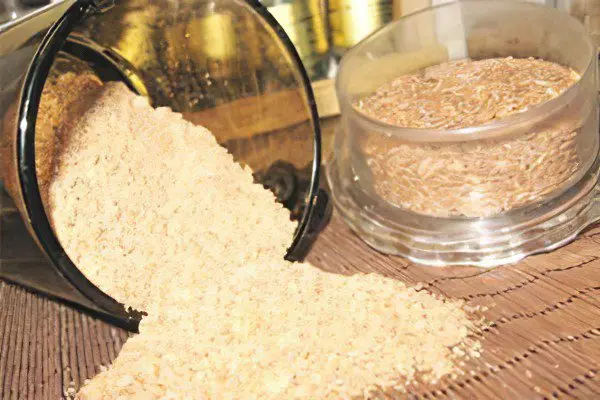
“Everything is medicine, and everything is poison,” Avicenna said. Therefore, when eating such an unusual product as flax seeds, one should adhere to the consumption rate described in the first question of this section. The limitation is due to the high content of cyanogenic glycosides (eg, thiocyanate). These substances are found in abundance in raw plant foods (especially seeds), but break down when exposed to high temperatures, so cooking easily solves this problem.
In addition to poisonous cyanogens, flax seeds contain a compound that produces a strong choleretic effect. Because of it, it is not recommended to get involved in flaxseeds in case of gastrointestinal diseases such as diarrhea, cholecystitis, colitis. With pancreatitis, it is impossible to take seeds in their pure form, only prepare jelly / decoction from them, which has a calming effect on the pancreas.
If the dosage regimen is incorrectly set, flatulence and bloating are possible – you should always start with a small amount of seeds, and gradually increase it to the required rate.
Hypersensitivity of the body to any of the components of flaxseed, as in the case of any drug, is a categorical contraindication to use.









